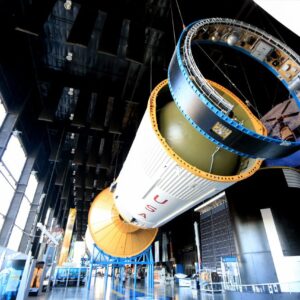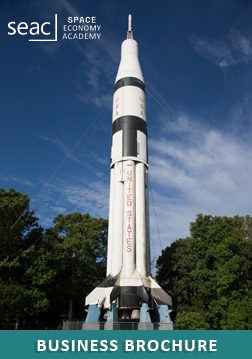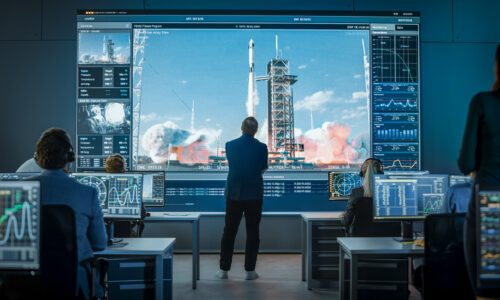ECSS Standards
Limited Places
Deadline: 26 January
Register now to access the course.
- Space
- 278 (Registered)
 Download the Brochure
Download the Brochure
The Next Space Frontier
The ECSS (European Cooperation for Space Standardization) standards play a vital role in the development, operation, and safety of space missions across Europe and beyond. These standards serve the crucial need of ensuring interoperability, reliability, and quality throughout the entire lifecycle of space systems. From design and manufacturing to testing and operation, adherence to ECSS standards fosters consistency and compatibility among different components and subsystems, ultimately reducing risks and costs associated with space endeavours.
Moreover, these standards are not static; they evolve to address emerging challenges and incorporate technological advancements. Recent trends in ECSS standards reflect a growing emphasis on sustainability, cybersecurity, and the integration of new materials and propulsion. As the space industry continues to expand, the ECSS remains a cornerstone for ensuring the success of the space missions.
Learning Objectives
ECSS Standards course covers all the key elements for every space project: management, engineering, product assurance, and sustainability. Explore the realities of managing a space activity, from adopting standards, making strategic decisions, managing people and performance effectively.
Focusing on the development of critical thinking, the ECSS Standards course provides you with the knowledge about Space Standardization. Learn the tools and apply international standards to work with or for the European Space ecosystem like space sustainability.
Whether you are managing a small or a complex project, you need to acquire the knowledge related to space standardization. The course provides you with a 360 degrees view from project management to system engineering and product assurance.
Space Missions are ever-changing, with increasingly sophisticated architectures. Now more than ever, companies and agencies, require innovative, qualified employees to prepare and support new projects. The European Cooperation for Space Standardization develops a single set of user-friendly standards for use in all European space activities.
SEAC – Certificate of Completion
Advance your career in Space Economy with SEAC—first-prize winner of the Galileo Masters University Challenge. Incubated at ESA BIC Hessen with leading industry partners, you’ll earn a Certificate of Completion in ECSS Standards.
The skills you will develop
Through this ECSS Standards course, you will accelerate career, master lifecycle standards, develop your skills, and apply ECSS across sectors
- Kick start or accelerate your career in the Space sector, understanding the application of Standards in space.
- Learn about ECSS Standards using a 360 degrees perspective: from general standards, to project management.
- Develop operational strategy and managerial skills to lead the field.
- Recognize the needs and the usage of ECSS Standards through the phases of a mission lifecycle.
- Learn new innovative strategies based on real-world business experience, explained by top lecturers.
- Proficiency in the application of ECSS Standards in Space Agencies, Industries, Start-Ups and Academia.
Participant Profile
Participants of the ECSS Standards course are:
- Engineers who want to learn about ECSS Standards, understand their organization, their branches, and requirements management.
- Engineers who want to start or accelerate their career using ECSS Standards, and need to understand the correlation between them, interpret and understand how to apply to a specific project.
- Managers involved in the development or operations of a Space Mission or component and need to acquire the overall understanding of all the component and the application of the standards for different elements and in different phases of the mission lifecycle.
Career Center
SEAC offers career acceleration with lifetime access to premium packages, and unlocking private job notifications through our Careers platform. Foster development through lifelong learning, mentoring and networking.
- Accelerate your career with SEAC- Careers: Unlock the private job offers , and get lifetime premium package.
- Live Sessions with instructors: Twice a year, meet the instructor, and get career advices.
- Lifelong Learning: Lifetime updates in the courses, and loyalty discount of up to 15% to all Alumni.
- Mentoring Opportunities at SEAC, access mentoring and network opportunities regularly.
 Download the Brochure
Download the Brochure
Curriculum
- 6 Sections
- 41 Lessons
- Lifetime
- Module 1: ECSS Standards8
- Module 2: ECSS – PROJECT MANAGEMENT8
- 2.11. Elements of a Project and Project Management (reference to Prince 2)
- 2.22. Standards applied to the Space Sector (reference to ECSS standards)
- 2.33. Roles and Responsibilities
- 2.44. Project Lifecycle
- 2.55. Reviews and Key milestones, from Phase A to Phase F of a mission development
- 2.66. Mission Documentation and Risk Management
- 2.77. Project Management Office (PMO)Assignment 2 with research study
- 2.88. Assignment 2 with research study
- Module 3: ECSS – SYSTEM ENGINEERING8
- 3.11. What is a System
- 3.22. System Thinking and System Engineering
- 3.33. Technical SE processes and the VModel
- 3.44. System Lifecycle – Requirements, Architecture, Verification, Validation and Testing
- 3.55. ECSS Standards – Engineering Branch
- 3.66. MBSE – Model Based System Engineering
- 3.77. Future Standards
- 3.88. Assignment 3 with research study
- Module 4 : SPACE ENGINEERING, GROUND SYSTEMS AND OPERATIONS8
- Module 5: PRODUCT ASSURANCE9
- Module 6: PROJECT WORK0
Lecturer
Dr. Lucia Fonseca de la Bella is the Faculty Strategic Project Manager for the Space Sector at the University of Surrey, where she leads the development of the new Surrey Space Economy Institute. In this role, Dr. Fonseca supports the University’s research and innovation strategies in the space sector, while also developing initiatives to strengthen partnerships with key industry players. Previously, she served as the European Space Agency's Business Applications Ambassador in the UK, a position in which she helped non-space companies incorporate space assets into their operations.










